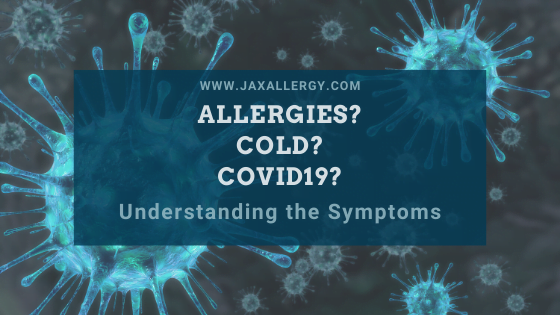Is it the Flu, Cold, or Allergies: How to Tell The Difference

Updated: Nov 2021 — to address questions and concerns about the novel Coronavirus 2019 (COVID-19)
Please see our message about COVID19 procedures at our clinics
Feeling run down and stuffed up?
Are your eyes itchy and your nose running?
One thing is for sure—you’re not feeling like yourself. But are you suffering from allergies, the common cold, or even worse, the flu or potentially coronavirus/COVID-19?
It’s not always easy to identify the cause as you might think. The symptoms for each of these illnesses frequently overlap. However, there are some tell-tale signs to be aware of that may help you determine what the problem is and decide the best course of action.
Study the following symptoms to make sure you’re properly treating the underlying cause of your discomfort. As always, remember discussing this with your physician is the best option.
Updated Nov 2021: Signs and Symptoms of COVID-19
In late 2019 a new virus started spreading, all indications being that its onset began in China and started spreading rapidly. This particular virus, part of a family of viruses called Coronavirus (which include the common cold). This specific virus had been previously unknown. This is why initially it was called a novel coronavirus.
Common Signs and Symptoms of COVID-19:
The reported illnesses for coronavirus diseases 2019 range from very mild (including some cases where the individual shows no symptoms) to severe illness, respiratory distress, and in extreme cases death. Most symptoms appear somewhere between 2 and 14 days after exposure. This is what makes this virus extra concerning, it is possible to carry for a long time without symptoms but passing on the virus.
Symptoms include:
- Fever
- Dry, unproductive cough
- Shortness of breath
- Fatigue
- Some people present with body aches and pains
A big difference between allergies and COVID-19 is that individuals with allergies tend to have allergy symptoms that are regularly occurring and allergies are unlikely to cause a fever.
Who is most at risk for COVID-19?
This is still a new virus and many health agencies are learning how COVID-19 affects individuals, some things seem clear: older individuals (especially over 60) and people with pre-existing medical conditions (such as high blood pressure, diabetes, heart disease, or COPD/lung disease) appear to be most in danger of developing the worst symptoms of COVID-19.
Other risk factors:
Current information indicates overseas travel or travel aboard cruise lines potentially puts individuals at higher risk for exposure to COVID-19. Additionally, being in close proximity to someone who may have been exposed or is showing symptoms could put you at risk.
How to prevent illness
COVID-19 is spread person-to-person. Primarily when an infected person coughs or sneezes and produces droplets into the air. It can also spread between individuals who are within 6 feet of each other. The droplets and contact cause the virus to be inhaled. Additionally the close contact touching can result in it being spread to the eyes, mouth, nose when individuals invariably touch their face.
CDC and common sense recommendations to help prevent illness and the spread of the virus include:
Clean hands often. Wash hands with soap and water for at least 20 seconds (water temp does not matter). If soap and water are not available, use a hand sanitizer.
Avoid touching your face and others. Especially with unwashed hands. Face touching is a common problem, so you must be vigilant about limiting it.
Limit close contact with others. This is especially true if you suspect you may be sick or suspect someone else of being sick. In addition practice limiting ‘social gatherings’ where large groups may be together. The less social contact during this time the better potential outcomes we should see. If you are sick (or suspect you are) and cannot stay home, wear a mask when possible.
Clean and disinfect surfaces regularly. All surfaces you frequently touch should be regularly washed and disinfected. This includes handles, doorknobs, counters, phones, keyboards, and sinks.
When should you contact a doctor?
If you believe you are showing symptoms of COVID-19 or feel ill, call your healthcare provider. Older patients or immunocompromised individuals should contact their healthcare providers very early, even if symptoms are extremely mild. Your doctor will best be able to help determine if you should get tested.
If you or a loved one develop any EMERGENCY WARING SIGNS for COVID-19 you should seek medical attention IMMEDIATELY.
These emergency warning signs include (but may not be limited to):
- difficulty breathing or extreme shortness of breath
- chest pain
- confusion or an inability to be awoken or aroused
- bluish lips or face
all information and guidance is available via the CDC at coronavirus.gov and through the World Health Organization Coronavirus page
For local information visit the Florida Department of Health — Duval Dashboard
Signs of the Common Cold
The dreaded common cold. It’s common enough for everyone to experience it, but somehow it still doesn’t have a cure. It comes around frequently enough to be a problem as adults suffer from an average of 2 to 3 colds a year.
If you’re feeling under the weather, keep an eye on the following cold-like symptoms:
- Mild fever
- Thick, green or yellow mucus
- Coughing
- Sore throat
- Development of symptoms over a few days’ time
- Mild body and headaches
Colds are most common in the spring and winter, but can show up any time of year.
Flu Symptoms
Flu symptoms tend to be similar to cold symptoms but are often more severe. An estimated 200,000 Americans are hospitalized due to the flu or flu-related complications each year. Some groups of the general population especially children and the elderly are more likely to suffer from life-threatening cases of the flu.
The following tell-tale signs point to the flu:
- A high fever lasting 3 to 4 days
- Severe body aches
- Fatigue/exhaustion
- Development of symptoms over a few days
- Coughing
- Sore throat
Like the common cold, it’s possible to get the flu at any time of year but its peak season lasts from December to February.
Allergy Symptoms
Allergies have the uncanny ability to mimic cold and flu symptoms. However, they’re not caused by viruses but instead, provoked by an allergen or allergens. Allergies may develop at any stage of life and can cause chronic symptoms.
If you suspect you have allergies, watch out for the following:
- Chronic congestion and coughing
- Seasonal patterns of symptoms
- Clear nasal discharge
- Congestion
- Coughing
- Watery, itchy eyes
- Pain under cheekbones and teeth
- Reaction right after exposure
Allergies may develop any time an allergen is present.
When to Talk to an Allergy Specialist
We often think of allergies as being as simple as a sniffle or a cough, but they can progress if not cared for. An allergy specialist will help you manage allergies and help you improve your quality of life.
Allergists can identify what triggers your allergies and then determine the most appropriate course of treatment. In some cases, over-the-counter medications may be ineffective. Your allergist may prescribe medications to reduce the symptoms of your allergies and prevent reactions.
If you’re having trouble performing everyday tasks or your allergy symptoms are getting in the way of you enjoying life, it’s time to meet with an allergy specialist—contact Allergy and Asthma Specialists of North Florida to set up a convenient appointment to meet with one of our board certified allergy specialists.
Symptoms such as chronic infections, chest tightness and breathing difficulties may require immediate attention.
